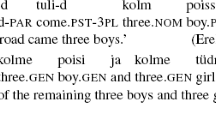Abstract
Chierchia’s comparative analysis of nominals based on the two features [\(\pm \) arg] and [\(\pm \) pred] has lead to many discussions on the semantics of nominals in argument positions and predicate positions. On the other hand, many syntactic results about left dislocation and topicalization have been accumulated. In this paper, we will try to elucidate possibilities of bare plurals in the left periphery and differentiate their readings. By examining data from Italian and German we claim that different demands on foregoing contexts are organized as constructions, as far as the left periphery is concerned. In addition, those constructions also reflect an organization of discourse.
Access this chapter
Tax calculation will be finalised at checkout
Purchases are for personal use only
Similar content being viewed by others
Notes
- 1.
Pollo and soldi in (3) seem to refer to kinds. However, pollo is a mass noun. Moreover, although soldi is a plural form of soldo, this word is always used in a plural form in this meaning. Therefore, it is not clear whether bare plurals can denote kinds in the left periphery as well.
- 2.
However, it is a little difficult to show that these bare plurals are kinds. We cannot check whether bare plurals really denote kinds with kind predicates because the predicate in the main clause does not have to be a kind-predicate. Moreover, in the first place, bare plurals licensed by ne cannot occur with kind-predicates (Zamparelli p.c.). For example Ratti, ne stermino ‘Rats, ne (I) exterminate.’ is ungrammatical. We assume this ungrammaticality is due to the meaning of ne, which existentially quantifies entities rather than denying that bare plurals are kinds. From contexts, bare plurals seem to denote neither specific indefinite entities nor contextually salient entities.
References
Benincà, P.: L’ordine delle parole e le costruzioni marcate. In: Renzi, L., Salvi, G., Cardinaletti, A. (eds.) Grande Grammatica Italiana di Consultazione, vol. 1, pp. 129–239. Il Mulino, Bologna (1988)
Brunetti, L.: On links and tails in Italian. Lingua 119, 756–781 (2009)
Carlson, G. N.: Reference to Kinds in English. Ph.D. Thesis, University of Massachusetts at Amherst (1977)
Chierchia, G.: Reference to kinds across languages. Nat. Lang. Seman. 6, 339–405 (1998)
Dayal, V.: Number marking and (In)definiteness in kind terms. Linguist. Philos. 27(4), 393–450 (2004)
Ebert, C., Endriss, C., Hinterwimmer, S.: A unified analysis of conditionals as topics. In: Proceedings of SALT, 18, Amherst (2008)
Ernst, T.: Domain adverbs and the syntax of adjuncts. In: Austin, J.R., Engelberg, S., Rauh, G. (eds.) Adverbials, pp. 103–129. John Benjamins, Amsterdam (2004)
Frey, W.: Pragmatic properties of certain german and english left peripheral constructions. Linguistics 43(1), 89–129 (2005)
Gerstner, C., Krifka, M.: Genericity, an introduction. Ms., Universität Tübingen (1987)
Grice, P.: Logic and conversation. In: Cole, P., Morgan, J. (eds.) Syntax and Semantics: Speech Acts, vol. 3, pp. 41–58. Academic Press, New York (1975)
Partee, B.H.: Noun phrase interpretation and type-shifting principles. In: Groenendijk, J., et al. (eds.) Studies in Discourse Representation Theory and the Theory of Generalized Quantifiers, pp. 115–144. Foris, Dordrecht (1987)
Roberts, C.: Information structure in discourse: towards an integrated formal theory of pragmatics. In: Yoon, J.-H., Kathol, A. (eds.) OSU Working Papers in Linguistics, 49: Papers in Semantics, The Ohio State University (1996)
Zamparelli, R.: Layers in the Determiner Phrase. Ph.D. Thesis, University of Rochester (1995)
Zamparelli, R.: Definite and bare kind-denoting noun phrases. In: Beyssade, C. Bok-Bennema, R., Drijkoningen, F., Monachesi, P. (eds.) Selected papers from Going Romance 2000, pp. 305–342. John Benjamins, Amsterdam (2002)
CORpus di Italiano Scritto, Università di Bologna. http://corpora.ficlit.unibo.it/
Author information
Authors and Affiliations
Corresponding author
Editor information
Editors and Affiliations
Rights and permissions
Copyright information
© 2014 Springer International Publishing Switzerland
About this paper
Cite this paper
Mori, Y., Hirayama, H. (2014). Bare Plurals in the Left Periphery in German and Italian. In: Nakano, Y., Satoh, K., Bekki, D. (eds) New Frontiers in Artificial Intelligence. JSAI-isAI 2013. Lecture Notes in Computer Science(), vol 8417. Springer, Cham. https://doi.org/10.1007/978-3-319-10061-6_6
Download citation
DOI: https://doi.org/10.1007/978-3-319-10061-6_6
Published:
Publisher Name: Springer, Cham
Print ISBN: 978-3-319-10060-9
Online ISBN: 978-3-319-10061-6
eBook Packages: Computer ScienceComputer Science (R0)




